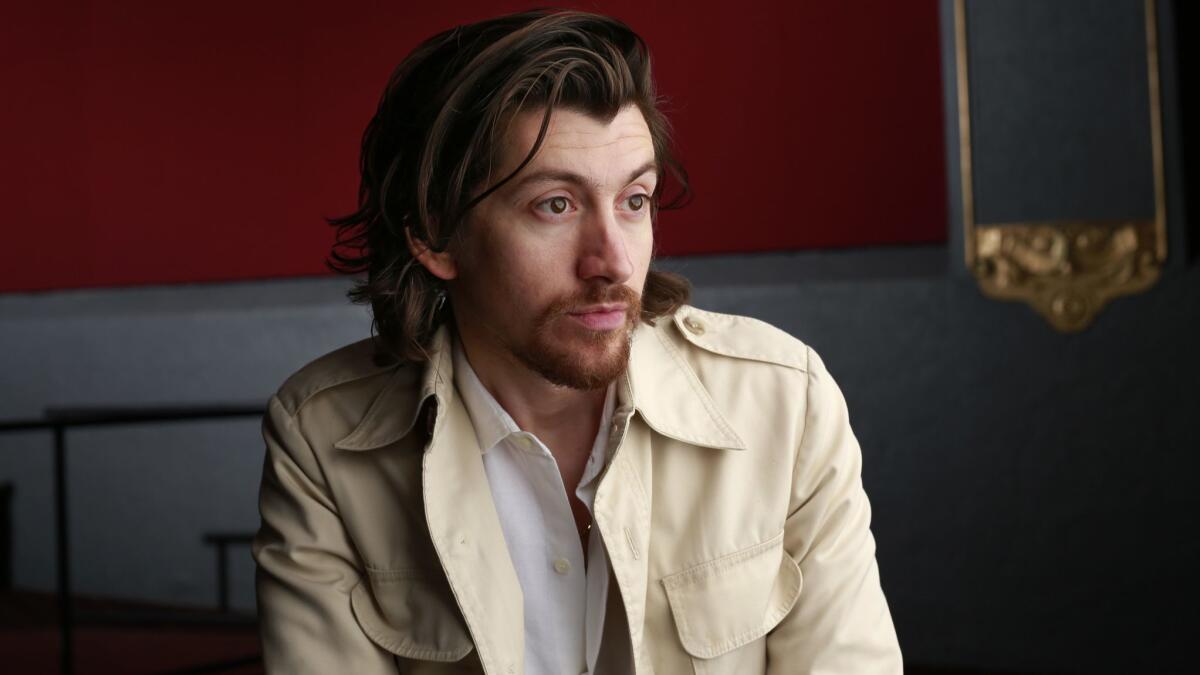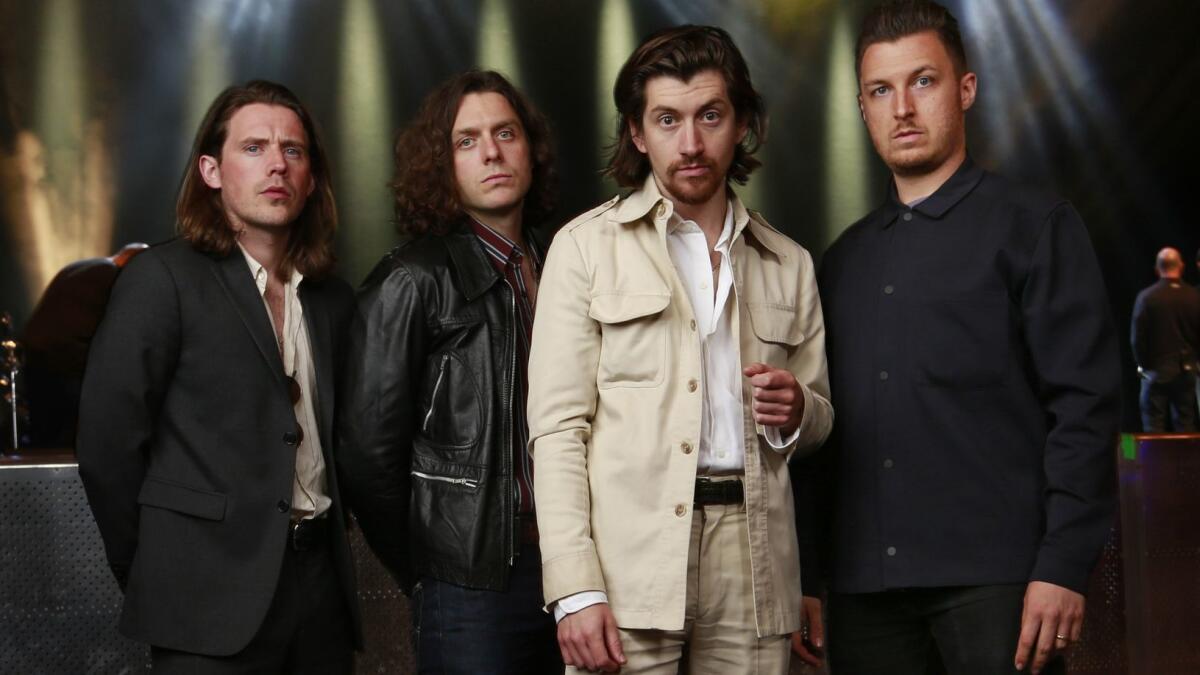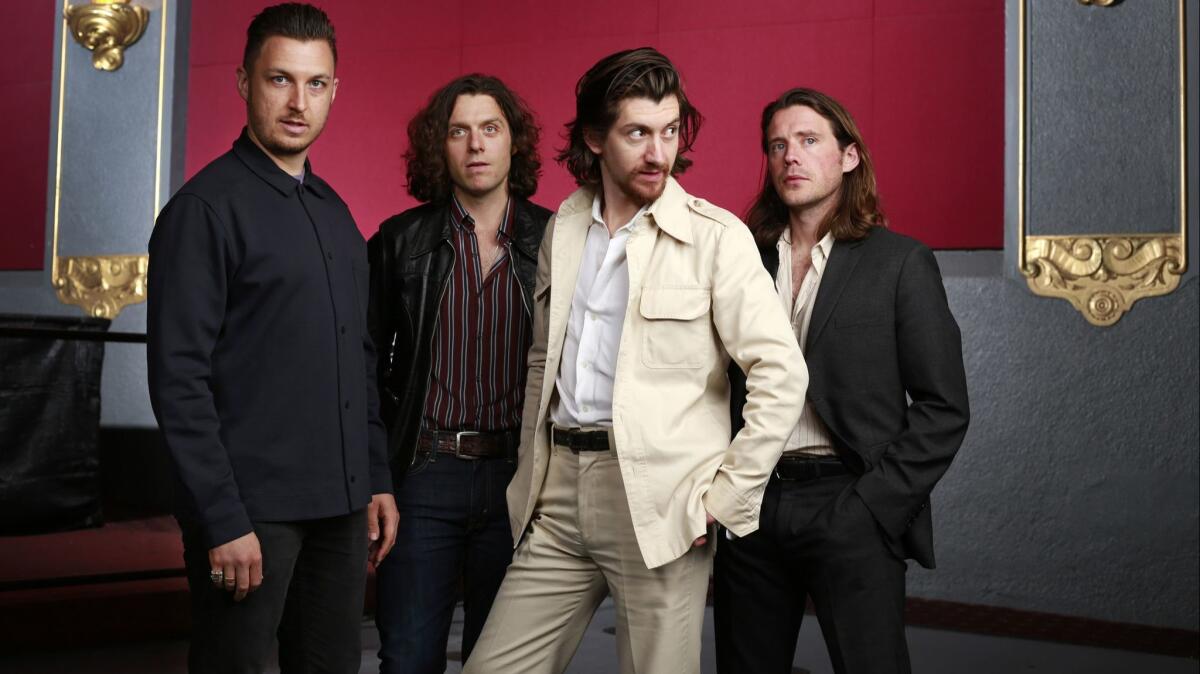Arctic Monkeys’ Alex Turner has gone to the moon and has an album to show for it

Can we take a moment to talk about your notebook poking out of your pocket here? Alex Turner jumps. Too invasive a question.
“Oh! Uh heh,” he mutters, burrowing his hand into his blazer. He shifts the notebook into his other pocket, out of sight of a journalist’s X-ray vision. Turner, now 32, as the leader of Britain’s Arctic Monkeys, is a man who believes in mythology. You don’t ask him about his notebook. You don’t ask Samson what shampoo he uses.
“It’s a school trick,” the current L.A. resident says in his Yorkshire drawl. “Me mother was a high school teacher, and she would say, ‘If you write the thing, you remember it.’ She’s right.”
Turner struggles to remember words and takes exceedingly long to locate them.
Back in Turner’s homeland, Arctic Monkeys are Britain’s biggest band. They’re on the verge of releasing “Tranquility Base Hotel & Casino,” their sixth album and first in five years. No amount of feverish anticipation will prepare fans for their least traditional, most obscure set of tunes, which play out like wonky vignettes rather than verse-chorus anthems.
Today, however, Turner is struggling to describe the inflections of his vocal tones on this album. His voice goes to theatrical places it’s never been before. “What’s the word for it now?” he asks, describing his as-yet-unparalleled vibrato on the album’s title track. “Aw. Forgotten the word.”
It’s OK if you can’t find it.
“I can’t get the other new word I’ve learned out of me head to remember that one.”
What’s the other word?
“It’s referring to the spaces between text. Uh… Kerling?”
Kerning.
“Kerning! That’s getting in the way of me remembering what the word is to describe the name of… not the pitch, but how wide the voice is. Not high or low but…”
Even the fact of it being Monday is a cue Turner takes time to chew over, stroking his goatee, screwing his eyes into his black coffee. He arrives at “unmistakable.” It’s an “unmistakable” Monday morning.
“Not to read your notes, but me name there?” he asks, looking at the “ALEX TURNER” header on my notebook. “That’s a frightening thing.”

Funny that. This new Arctic Monkeys album sounds like a solo record. It was conceived like a solo record. “This album’s quite uh… well, it’s fairly different,” Turner admits. And yet it’s an “Arctic Monkeys” record. Was it ever going to be solo?
He looks at his name again. “Let me think about that.” Elvis Presley sings a whole chorus of “Hound Dog” on the jukebox at the 101 Coffee Shop while Turner closes his eyes, summoning his tongue. “I don’t think it was ever gonna be… There’s no interest right now of doing a… I definitely set out to make a Monkeys record.”
Arctic Monkeys are that rare breed of band disproving the popular theory that rock ’n’ roll is currently out of favor. The group instantaneously sold out Saturday’s show at Hollywood Forever, and just as quickly packed two nights at the Hollywood Bowl in October. The band’s 2013 album, “AM,” reached the top 10 in the U.S., and overseas, the act has entertained five No. 1 LPs.
The band has three Grammy nominations, and its “AM” managed to win the Brit Award for album of the year. Turner made a speech at the ceremony that became the most talked-about in Brits history — as loathed as it was loved.
“That rock ’n’ roll, eh,” he said. “That rock ’n’ roll, it just won’t go away.” He dropped the mike and walked offstage. In a room full of of-the-moment, stream-chasing pop, you were either with or against him.
“Ah!” he says, recalling it. “I’d rather I hadn’t dropped the microphone. It would’ve been best unpunctuated. There are times I wish I would’ve behaved differently. The first time we did the NME Awards, I walked up in a way that caused my auntie to be alarmed. ‘That’s not how you walk’. It wasn’t. But in the case of the Brits speech, that was more my walk. Maybe not completely, but it was a lot closer to the way I actually walk.”
It’s often been remarked that nobody knows where “Alex Turner: unattainable rock star” ends and “Alex Turner: everyman bard” begins. He prefers his work to speak for him. Monkeys aside, Turner is a workaholic.
In 2008, during the Monkeys’ first hiatus, he began a side project, the Last Shadow Puppets, with Liverpool’s karaoke Rod Stewart, Miles Kane. He composed the soundtrack to the 2011 film “Submarine.” In 2016, after the Monkeys’ second hiatus, Kane and Turner reunited for a second LP. From his Los Feliz home studio, he found singer-songwriter Alexandra Savior and in 2017 co-produced her debut.
It’s the Monkeys, however, that remain his bread and butter.
Anticipation overshadows their every move. It’s been five years since “AM.” The band won’t be previewing anything until the album’s May 11 release. For good reason. There are no obvious singles.
It’s the group’s most challenging work; as close to Last Shadow Puppets as Monkeys could be — virtually chorus-less, very L.A., as strange as David Bowie’s “Moonage Daydream” by way of the Divine Comedy.
It’s a concept record taking place in a taqueria on the moon — one, as depicted by the album’s cover, Turner actualized by building it with cardboard himself. The creation looks like a set piece from the ‘60s British sci-fi series “Thunderbirds.”
While on this lunar stage, Turner’s become comfortable ridiculing society with his most observational lyrics since 2006. “I do feel the closest I’ve been to the first record,” he agrees. “I found the poetry in this ridiculous idea of a set on the moon. Science fiction can set these fantasy worlds on other planets in order to…”
He stalls. To create a sociological allegory from which to analyze the status quo? Like “Star Wars”? “That’s your headline: ‘New Monkeys: It’s like “Star Wars.”’ I suppose I can’t disagree with ya.”
Despite its judgments, the album seeks to entertain. Turner picked up phrases from news bulletins to fit to melody. “One Point Perspective” opens: “Dancing in my underpants, I’m gonna run for government.” On songs “Batphone” and “The World’s First Ever Monster Truck Front Flip,” he critiques technology. “You and Genie wearing Stetson hats, trying to gain access to my Lily pad,” he rhymes, poking at the iCloud.

“Star Treatment” explores his bird’s-eye view of celebrity, compiled of strange nocturnal chatter. “What do you mean you’ve never seen ‘Blade Runner’?” he croons. It’s cheerily odd. It’s undeniably Turner.
It’s also a mirror of where he’s at. For Turner, L.A. could be as bizarre as being an astronaut on a space station. He lives “just up the road” amid faded Hollywood glamour and Scientology buildings. Only one of his childhood friends is a neighbor — drummer Matt Helders. Guitarist Jamie Cook and bassist Nick O’Malley are in Britain.
It’s not geography that’s isolated Turner. While he gallivants amid his nostalgia-led future, the other three are married with kids. “Ah’ve never felt more marooned, Eve,” he smiles slowly, surely.
***
The opening line of ‘Tranquility Base Hotel And Casino’ reflects Turner’s self-awareness: “I just wanted to be one of the Strokes / Now look at the mess you made me make.”
Upon emerging, the Monkeys were christened the “British Strokes.” Turner was a huge fan: “I don’t think we would have gone into me mam and dad’s garage without them.”
It wasn’t intended as the first line, but as a placeholder. Turner talks about Paul McCartney’s method. Folklore goes that “Yesterday” began with the working words “scrambled eggs.”
“This was a bit of a scrambled eggs,” says Turner. “I’ve wondered who I’m talking to in that song. I’m talking to meself, really.”
On “Star Treatment,” Turner grapples with the passage of time. “This feeling of, ‘Hang on, I was just there a minute ago. It seemed just now that I was wanting to be one of…’ ” He thinks.
“Even one of the ones in the other bands that were like the Strokes.” The Vines or something? “Oh I loved the Vines,” he says of the Australian grunge band. “Me and Nick O’ Malley loved the Vines. You saying the Vines, I’m sure I dreamt about the Vines the other…”
Since their Vines aping days, they’ve seen many incarnations. The second record was louder; the third was a dark psych freakout; their fourth wistful and pop, their fifth all beats and riffs. This one is a sharp left turn, their most daring since the third.
At the time, that album – 2009’s “Humbug” — sounded very out there, but it built the bridge to now. This record is wildly different again, but perhaps born from a similar mentality.
“Yeah, there’s something to that,” Turner pauses. “Both this and that felt like it was the only move we could make. There’s an idea that this album’s radically removed from where we’ve been. I can sort of see that, but I don’t think it’s as much of a move as people suggest. The reactions make it seem like I had more of a choice in it than I did. I don’t know if there was anything else I could have done.”
Turner’s lunar spaceship came in the form of a piano he received for his 30th birthday. As is tradition, he wrote “almost completely alone,” but his hands fell into different places than they would on guitar.
For the first time, he began recording on his own in the spare bedroom with his 8-track. He drew upon sci-fi texts, the music of Dion, and the jazz clubs featured in three Jean-Pierre Melville films: “Le Samouraï,” “Le Cercle Rouge” and “Un Flic.” It was the most he’d worked independently before recruiting “the lads.” The lads were on board. They reconvened in Paris with regular producer James Ford.
You wonder how these songs make Turner feel. “That’s difficult to answer. I don’t know if I ever get to feel the way I do when I listen to my favorite records.”
He pokes his ear to the ceiling. “Pet Sounds” just came on. “Right on cue with Brian!” he smiles. “This record is so California, innit? It takes me back to driving through a village between Sheffield and Rotherham — this place called Rawmarsh, where me dad used to work. I’ve driven up the 101 listening to ‘Pet Sounds,’ but in me mind I’m going to Rawmarsh…”
He stops himself before getting too personal.
The last line on the album is one of its only introspective moments: “I’ve done some things that I shouldn’t have done. But I haven’t stopped loving you once.”
What did he do? “Ehm.” He starts laughing. “It’s hard to say, innit? There’s one thing regretting something and another for it to be published.”
He distracts with a mistake from earlier in his life: The Strokes. He came to them too late and missed the early gig they played at Sheffield’s Leadmill. “I’d yet to receive that CD from Nick O’ Malley,” he says. “In me memory, he gave it me over the handlebars of a BMX. But I don’t know if I’ve somehow just invented that.”
Well, it wouldn’t be the first time.
More to Read
The biggest entertainment stories
Get our big stories about Hollywood, film, television, music, arts, culture and more right in your inbox as soon as they publish.
You may occasionally receive promotional content from the Los Angeles Times.










